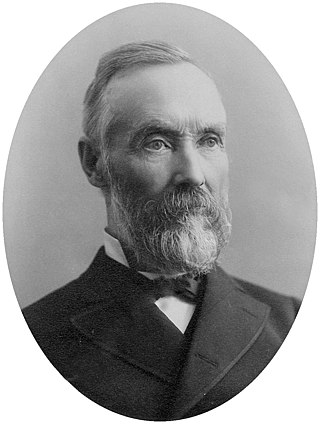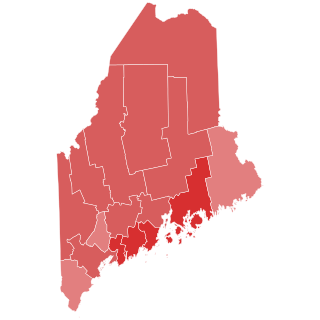
Meldrim Thomson Jr. was an American politician who served three terms as the 73rd governor of New Hampshire from 1973 to 1979. A Republican, he was known as a strong supporter of conservative political values.

The 1938 United States House of Representatives elections was an election for the United States House of Representatives were elections for the United States House of Representatives to elect members to serve in the 76th United States Congress. They were held for the most part on November 8, 1938, while Maine held theirs on September 12. They occurred in the middle of President Franklin D. Roosevelt's second term. Roosevelt's Democratic Party lost a net of 72 seats to the Republican Party, who also picked up seats from minor Progressive and Farmer–Labor Parties.
The Maine Democratic Party is the affiliate of the Democratic Party in the U.S. state of Maine.

The Maine Republican Party is an affiliate of the United States Republican Party in Maine. It was founded in Strong, Maine, on August 7, 1854. The party currently does not control the governor's office or either chamber of the Maine Legislature, nor either of Maine's two U.S. House seats and only controls one of the state's U.S. Senate seats.

Sebastian Streeter Marble was an American politician and the 41st Governor of Maine.

Lewis Orin Barrows was an American politician and the 57th Governor of Maine.
The following table indicates the party of elected officials in the U.S. state of Maine:

The 1994 Maine gubernatorial election took place on November 8, 1994. Independent candidate Angus King defeated Democratic Party candidate Joseph Brennan, a former Governor of Maine, Republican Party challenger Susan Collins, a regional coordinator of the Small Business Administration, and environmentalist Jonathan Carter. Ed Finks, as a write-in candidate, took in 1.29% of the vote. Incidentally, both King and Collins now serve together in the United States Senate since 2013.

The 1998 Maine gubernatorial election took place on November 3, 1998. Independent Governor Angus King sought a second and final term as governor. King faced off against former United States Congressman James B. Longley Jr., the Republican nominee; attorney Thomas J. Connolly, the Democratic nominee; and several other independent candidates, including Green candidate Pat LaMarche, who would later serve as the Green Party's Vice Presidential nominee in the 2004 presidential election.

The 1990 Maine gubernatorial election took place on November 6, 1990. Incumbent Republican Governor John McKernan defeated Democratic Party challenger Joseph E. Brennan in a tight contest. Independent Andrew Adam took in 9.3% of the vote. This was the last Maine gubernatorial election until 2022 in which the winner was of the same party as the incumbent president. This is also the last Maine gubernatorial election that a incumbent governor won with a smaller margin of victory in their re-election bid.

The 1982 Maine gubernatorial election took place on November 2, 1982. Incumbent Democratic Governor Joseph Brennan, who defeated Georgette Berube for his party's nomination, defeated Republican challenger Charles R. Cragin, who defeated Sherry Huber for the Republican nomination. Brennan defeated Cragin, winning his re-election by the highest percent margin in more than thirty years.

The 1940 Maine gubernatorial election took place on September 9, 1940. Incumbent Republican Governor Lewis O. Barrows was term limited and unable to seek re-election. Republican Maine Senate President Sumner Sewall faced off against Democrat Fulton J. Redman in the general election, beating him easily. This election was the last gubernatorial contest in Maine held prior to United States involvement in the second world war. Frederick G. Payne unsuccessfully ran for the Republican nomination.
"As Maine goes, so goes the nation" was once a maxim in United States politics. The phrase described Maine's reputation as a bellwether state for presidential elections. Maine's September election of a governor predicted the party outcome of the November presidential election in 22 out of the 29 presidential election years from 1820 to 1932: namely 1820–1844, 1852, 1860–1880, 1888, 1896–1908 and 1920–1932; more importantly, as Maine was a generally Republican-leaning state, the margin of the September elections compared to expectations could predict national November results more than the identity of the winning party in Maine. A contest still won by the Republicans but with a narrower margin than usual would still predict good Democratic results nationally.

The 2012 United States presidential election in Maine took place on November 6, 2012, as part of the 2012 United States presidential election in which all 50 states plus the District of Columbia participated. Maine voters chose four electors to represent them in the Electoral College via a popular vote pitting incumbent Democratic President Barack Obama and his running mate, Vice President Joe Biden, against Republican challenger and former Massachusetts Governor Mitt Romney and his running mate, Congressman Paul Ryan. Obama and Biden carried Maine with 56.27% of the popular vote to Romney's and Ryan's 40.98%, thus winning the state's four electoral votes.
The 1940 United States Senate election in Maine was held on September 9, 1940.

The 1936 Maine gubernatorial election took place on September 14, 1936. Incumbent Democratic Governor Louis J. Brann did not seek re-election. Republican Lewis O. Barrows defeated Democratic Party candidate F. Harold Dubord and Republican state legislator and Baptist minister Benjamin Bubar Sr., whose son Ben Bubar was later elected to the state legislature at 21 and later twice served as the Prohibition Party's presidential candidate.

The 1912 United States presidential election in Maine took place on November 5, 1912, as part of the 1912 United States presidential election which was held throughout all contemporary 48 states. Voters chose six representatives, or electors to the Electoral College, who voted for president and vice president. Maine was won by the Democratic nominees, New Jersey Governor Woodrow Wilson and Indiana Governor Thomas R. Marshall. Wilson and Marshall defeated incumbent President William Howard Taft, and his running mate Vice President James S. Sherman and Progressive Party candidates, former President Theodore Roosevelt and his running mate California Governor Hiram Johnson.

The 2022 Maine gubernatorial election took place on November 8, 2022, to elect the governor of Maine. Incumbent Democratic governor Janet Mills won re-election to a second term, defeating Republican nominee and former governor, Paul LePage. Neither candidate faced any primary opposition. An independent candidate, Sam Hunkler, received 2% of the vote, the lowest total for a third party or independent candidate in the state since 1982.
The 1880 Maine gubernatorial election was held on September 13, 1880 for a two-year term that was scheduled to run from January 13, 1881 to January 3, 1883. The contest resulted in the victory of Greenback and Democratic nominee Harris M. Plaisted, who narrowly defeated incumbent Republican Governor Daniel F. Davis, one of the few times Republicans lost control of the governorship between the founding of the party in the 1850s and the Great Depression.
The 1900 Maine gubernatorial election took place on September 10, 1900.















